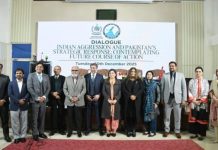By Asad Cheema
ISLAMABAD: Chairman Rice Research and Development Board Punjab Shahzad Ali Malik on Sunday stressed the urgent need for switching over to “Intercropping” for growing two or multiple crops simultaneously in the same field for bumper agricultural production to achieve food autarky besides boosting the profitability of farmers across the country.
Talking to a delegation of progressive farmers led by Pir Saddam Hussain Shah of Pindi Shaikh Musa district Faisalabad, he said Intercropping can significantly enhance overall crop productivity. By growing different crops together, farmers can maximize the use of available resources, such as sunlight, water, and nutrients, he added.
He said the complementary nature of different crops helps in better utilization of the growing space, resulting in higher yields per acre. “Income from intercropping can improve farm profitability and financial stability,” he said.
Intercropping provides a form of insurance against crop failure. If one crop is susceptible to pests, diseases, or adverse weather conditions, the other crops in the mixture can compensate for the losses.
This diversification of crops reduces the risk of complete crop failure and helps farmers maintain a more stable income, he added. He said different crops have different nutrient requirements and Intercropping allows for the efficient utilization of soil nutrients, as crops with contrasting nutrient needs can be grown together.
He said overall, intercropping offers numerous advantages, including increased yield, risk reduction, efficient resource utilization, weed suppression, pest and disease management, soil improvement, economic benefits, and environmental sustainability.
It is a valuable strategy for optimizing agricultural production and promoting resilient and sustainable farming systems. Shahzad Ali Malik highlighting its advantages said some crops act as natural repellents or attractants for pests, which can help in pest management without relying solely on chemical interventions.
While concluding he said, on the other hand, Intercropping promotes biodiversity and ecological balance in agricultural systems. By cultivating diverse crops, farmers create habitats for beneficial insects, birds, and other organisms, which helps in natural pest control and pollination.
This approach reduces the reliance on synthetic pesticides and promotes sustainable farming practices.





